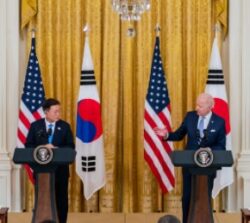by Charles Knight, initially published by the Institute for Peace and Diplomacy, 22 December 2021.
 This article reports on South Korean President Moon’s latest peace initiative, which has achieved an agreement “in principle” by the U.S., North Korea, China, and South Korea to negotiate an “end-of-war declaration.” Recently, the U.S. appeared to have modified its nuclear disarmament approach, accepting that “step by step” is the realistic way to proceed. A few article excerpts:
This article reports on South Korean President Moon’s latest peace initiative, which has achieved an agreement “in principle” by the U.S., North Korea, China, and South Korea to negotiate an “end-of-war declaration.” Recently, the U.S. appeared to have modified its nuclear disarmament approach, accepting that “step by step” is the realistic way to proceed. A few article excerpts:
A step-by-step approach requires give and take, [implying] that the U.S. might ultimately have to settle for some tempering of the North’s nuclear arsenal rather than the complete, verifiable, and irreversible disarmament (CVID.)
…a strategy of waiting patiently for sanctions to force Pyongyang’s capitulation…overlooks how existentially critical nuclear weaponry has become in North Korea’s strategic calculus. Without an adequate national security alternative, Pyongyang will most likely choose to suffer indefinitely under the economic pain of sanctions, however severe.
Alliances cannot and do not last forever. To endure from one era to another, they must adapt and change. If Washington returns to old habits of leveraging its hegemonic will to control affairs on the Korean Peninsula, it may reap the unintended consequence of hastening the end of the alliance.
